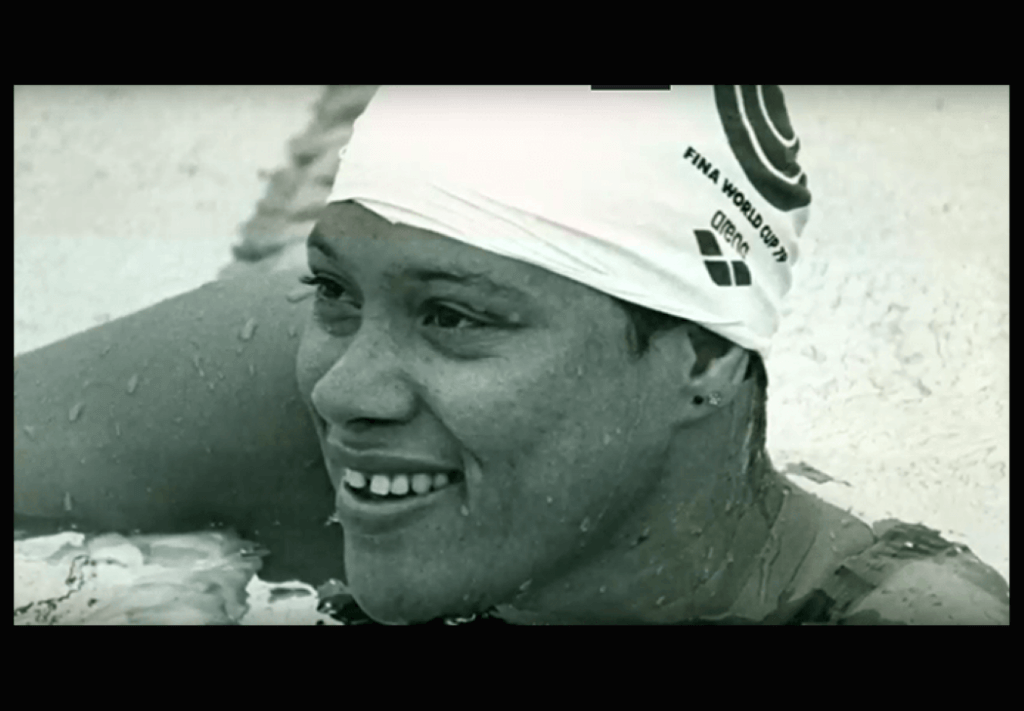Enith Brigitha: The Trailblazer For Black Women’s Success In Swimming

Enith Brigitha: The Trailblazer For Black Women’s Success In Swimming
Before the success of Simone Manuel, Alia Atkinson, Maritza Correia, and others, there was one great black woman swimmer who paved the way for them all. Her name is Enith Brigitha.
Brigitha, born on the Caribbean island of Curacao, swam for the Netherlands in the 1970s. The two-time Olympian swam at a time where, in America, black people were only just being allowed into pools after being systematically denied access for decades due to legal segregation.
While competing in an era where there were no swimmers that looked like her, she was a trailblazer for black women’s success in the pool. Brigitha became the first woman of African descent to win an Olympic medal, winning bronze in the 100 and 200 freestyle at the 1976 Montreal Olympic Games. Additionally, in her career, she set five short course world records and won one silver and two bronze medals at the World Championships. If not for the systematic doping of East Germany, Brigitha would have had Olympic gold.
With her inspiring career, she defied stereotypes and showed black women that they could achieve greatness in the sport.
Early Success Post-Brigitha Era
Since Brigitha’s retirement, we have witnessed progress in black women’s participation in swimming, with many going on to reach extraordinary heights in the sport. In 1988, Boston University’s Sybil Smith was the first African-American woman to score in an NCAA final. She placed sixth in the 100 back, becoming the first African-American swimmer to be a first-team Division I All-American in the process as well.
Eleven years later, Alison Terry became the first black female swimmer to make a U.S. National Team, qualifying for the 1999 Pan American Games.
Recent Milestones
Brigitha, Smith, and Terry’s achievements set the precedent for a string of success for black female swimmers in the 21st century.
African-American women swimmers finally had someone to relate to at the highest level when Maritza Correia made the journey to Athens as part of the U.S. Olympic Team in 2004. The Puerto Rico born swimmer was the first African-American to make a U.S. Olympic team and won a silver medal as part of the 400 freestyle relay team.
During those same Games, French swimmer Malia Metella won silver in the 50 freestyle, the highest ever individual Olympic placing for a black female swimmer at the time. At the 2014 World Short Course Championships in Doha, Jamaican Alia Atkinson became the first black woman to win a swimming world title, upsetting heavy favorite Ruta Meilutyté to win the 100-meter breaststroke.
Three months later, at the 2015 NCAA Division I Women’s Swimming Championships, we witnessed the first-ever all African-American podium at an NCAA swimming championship. Simone Manuel, Lia Neal and Natalie Hinds took the first three spots, respectively, in the women’s 100-yard freestyle.
Manuel built upon her stellar college career, becoming the first black woman to win an Olympic gold medal. At the 2016 Games, she used her incredible back-half speed to overtake the field and win the 100 freestyle in a new Olympic and American record, the gold shared with Canadian Penny Oleksiak. Since getting her hand on the wall first in Rio, Manuel has captured three individual world championship titles and will look to cement her legendary status in swimming and defend her Olympic title in Tokyo.
Work Toward Diversity and Inclusion in Swimming
Like Brigitha, all these women want to encourage more black children to swim so that black swimmers at the top of the podium at the Olympics or other international competitions is no longer an anomaly. After her swimming career, Alison Terry began implementing swimming programs in San Diego’s inner-city schools. Additionally, in 2000, through Terry and her husband’s encouragement, San Diego officials agreed to keep inner-city pools open year-round for the first time in history.
Both Correia and Atkinson are members of the traditionally black sorority Sigma Gamma Rho. Since 2013, Correia has been the spokeswoman for the Swim 1922 partnership between the sorority and USA Swimming, working to increase swim participation in the black community.
Manuel constantly uses her platform as a swimming superstar to advocate for diversity and inclusion in the sport.
Impact on Black Women’s Swimming History
As a result of their remarkable achievements, these women have helped to invalidate the stereotypes that have plagued African-Americans in swimming throughout time. Their success will hopefully serve as an inspiration for more young black girls to go out and try swimming.




I am so Hapoyo to read this History lesson which gave an honest account of black women’s amazing progress once they were given the opportunity.
It is quite obvious that in the next 5 yrs many more medals will be won by new black swimmers.
Well needed article….publish more informative articles about swimmer…coaches… Officials of colour!!Vee